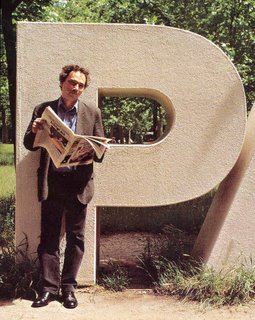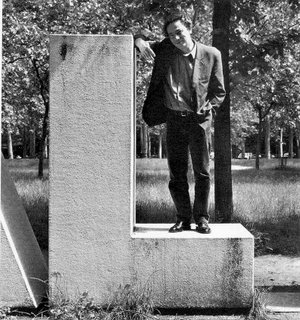

Philippe Leroux:
Voi(Rex) (2002)
IntroductionI. L’invisible debout.II. Jusque.III. De part […] En part.IV. Devant tout autour.V. L’inachevé à son faîte.For voice, six instruments, and live electronics on a text by Lin Delpierre f
During the last school year I had the wonderful opportunity to take a seminar and private lessons with
Philippe Leroux. . Although not well known in the U.S.A (apparently amazon.com does not even carry his music), Philippe Leroux is one of the most significant contemporary French composers. Unlike many his other colleagues from the post-spectral generation who often use almost predictable structural and formal techniques, Philippe’s music always defies expectations while exuding his wry and clever sense of humour.
Within only a few years,
Voi(Rex) has already become one of the formidable masterpieces in its genre. When composing the work at IRCAM, Philippe Leroux participated in a study documenting his compositional process. For this process he used custom patches in OpenMusic, kept a compositional diary, and was psychoanalyzed (sic) about the composition development. Some of the results of this study, in French, can be found online (here's
a partial formal description and
an analytical description) and in a
new DVD-Rom.
In the past year and a half I have seen Philippe Leroux give a few talks on
Voi(Rex)’s compositional process and have even had a chance to discuss some of the confusing issues with him personally. The most significant concept for
Voi(Rex) is the idea of a model. To compose the work Philippe Leroux first modeled the sound of the soprano singing alone and into a tam-tam with spectral analysis and selected the work’s 26 chords. Some other models included his previous compositions, the poem itself, various electro-acoustic techniques (e.g. frequency shifting, delay, time stretching, doppler), and the shape of the alphabet’s 26 letters. The latter technique, although used throughout the work, is used most transparently in the second movement where the poem’s letters spell out the music in gesture and orchestration.
I’m not fond of musical play-by-play descriptions, so I’ll just give a few heads up for listening. In the introduction, I’m particularly fond of how the voice seamlessly moves between the acoustic to electronic environments. The second movement is hilarious, particularly when you can see the letters, periods, commas, and even breath marks being spelled out. The third movement contains a glorious phantom ensemble and a beautifully subtle ocean wave at the end. As for the final movement, all I can say is to be prepared for the unexpectable as well as it is a shame to miss out on the surround sound movement and on watching the singing spell out the spatialization with a pencil.
Philippe Leroux biggest composition to date,
Apocolypsis for four voices, 15 instruments, and electronics premieres today in Paris alongside
Voi(Rex) as part of the IRCAM Agora.
Apocolypsis is based upon same concept as
Voi(Rex), except the model is the composing of
Voi(Rex). In his seminar in January he showed some sketches, tools, and the current state of
Apocolypsis. He claims that this work searches too far into in his method and simply far too much effort. In the future he will keep his compositions much simpler. The concert by Bit20 Ensemble, which features both works, will be broadcast in the future on Radio France. When I find the date and time I’ll post it so the curious can listen.
Labels: mixed compositions, Phillippe Leroux, post-spectral
posted by Jacob Sudol



